|
|
|
Sort Order |
|
|
|
Items / Page
|
|
|
|
|
|
|
| Srl | Item |
| 1 |
ID:
152590
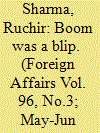

|
|
|
|
|
| Summary/Abstract |
The global recovery from the Great Recession of 2009 has just entered its eighth year and shows few signs of fading. That should be cause for celebration. But this recovery has been an underwhelming one. Throughout this period, the global economy has grown at an average annual pace of just 2.5 percent—a record low when compared with economic rebounds that took place in the decades after World War II. Rather than rejoicing, then, many experts are now anxiously searching for a way to push the world economy out of its low-growth trap. Some economists and investors have placed their hopes on populists such as U.S. President Donald Trump, figuring that if they can make their countries’ economies grow quickly again, the rest of the world might follow along.
|
|
|
|
|
|
|
|
|
|
|
|
|
|
|
|
| 2 |
ID:
152588


|
|
|
|
|
| Summary/Abstract |
Six decades ago, long before the Brazilian Senate’s August 2016 vote to impeach President Dilma Rousseff and remove her from office, one of the most beloved leaders in the country’s history was besieged by scandals of his own. President Getúlio Vargas, a stocky, gravelly voiced gaucho from Brazil’s deep south, had granted new rights, including paid vacation, to a generation of workers in the 1930s and 1940s. But after Vargas returned to power in 1951, one of his top aides was charged with murder, and Vargas himself faced allegations that the state-run Bank of Brazil had granted sweetheart loans to a pro-government journalist. “I feel I am standing in a sea of mud,” Vargas lamented. After a late-night cabinet meeting on August 24, 1954, failed to solve the crisis, and with numerous generals demanding his resignation, Vargas withdrew to his bedroom, grabbed a Colt pistol, and shot himself through the heart.
|
|
|
|
|
|
|
|
|
|
|
|
|
|
|
|
| 3 |
ID:
152577
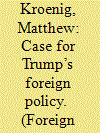

|
|
|
|
|
| Summary/Abstract |
Media coverage of U.S. President Donald Trump’s foreign policy has been overwhelmingly negative. Analysts have seized on early policy missteps, a supposed slowness in staffing the national security bureaucracy, and controversial statements and actions as evidence that Trump’s foreign policy is already failing.
|
|
|
|
|
|
|
|
|
|
|
|
|
|
|
|
| 4 |
ID:
152584
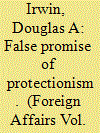

|
|
|
|
|
| Summary/Abstract |
In his inaugural address, U.S. President Donald Trump pledged that economic nationalism would be the hallmark of his trade policy. “We must protect our borders from the ravages of other countries making our products, stealing our companies, and destroying our jobs,” he said. Within days, he withdrew the United States from the Trans-Pacific Partnership (TPP), announced that he would renegotiate the North American Free Trade Agreement (NAFTA), and threatened to impose a special tax on U.S. companies that move their factories abroad.
|
|
|
|
|
|
|
|
|
|
|
|
|
|
|
|
| 5 |
ID:
152586
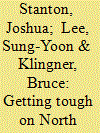

|
|
|
|
|
| Summary/Abstract |
For the past quarter century, the United States and South Korea have tried to convince North Korea to abandon its nuclear aspirations. Beginning in the early 1990s, Washington attempted to bargain with Pyongyang, while Seoul pursued a strategy of economic engagement, effectively subsidizing Pyongyang with aid and investment even as it continued to develop nuclear weapons. Then, after North Korea tested an atomic bomb in 2006, the United States pressed the UN Security Council to impose sanctions on North Korea. Yet at the urging of South Korea and for fear of angering China, the United States failed to use its full diplomatic and financial power to enforce those sanctions. All along, the goal has been to induce North Korea to open up to the outside world and roll back its nuclear and missile programs.
|
|
|
|
|
|
|
|
|
|
|
|
|
|
|
|
| 6 |
ID:
152589
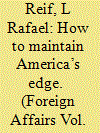

|
|
|
|
|
| Summary/Abstract |
In February 2016, scientists from the Massachusetts Institute of Technology (MIT) and the California Institute of Technology, or Caltech, joined with the National Science Foundation (NSF) to share some remarkable news: two black holes 1.3 billion light-years away had collided, and the resulting gravitational waves had been “heard” by the twin detectors of the Laser Interferometer Gravitational-Wave Observatory (LIGO). This was the first time such waves—ripples in the space-time continuum caused by the violent acceleration of massive objects—had ever been directly observed. Albert Einstein had predicted such waves a century ago, but it was long doubted that instrumentation sensitive enough to confirm their existence could ever be created. It took more than four decades of work by a vast team of scientists to make the impossible possible.
|
|
|
|
|
|
|
|
|
|
|
|
|
|
|
|
| 7 |
ID:
152585
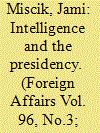

|
|
|
|
|
| Summary/Abstract |
U.S. presidents and other senior policymakers often come into office knowing little about the 17 federal agencies and offices that make up the U.S. intelligence community, but in short order, they come to rely heavily on its unique technologies, tradecraft, and expert analysis. The intelligence community’s mission is to provide national leaders with the best and most timely information available on global affairs and national security issues—information that, in turn, can help those leaders achieve their foreign policy objectives.
|
|
|
|
|
|
|
|
|
|
|
|
|
|
|
|
| 8 |
ID:
152587
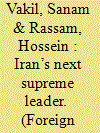

|
|
|
|
|
| Summary/Abstract |
On July 17, 2016, Ayatollah Ali Khamenei, Iran’s supreme leader, turned 77. Rumors that he suffers from cancer have circulated for over a decade, and in 2014, the state-run news agency published photos of him recovering from prostate surgery. Although Khamenei’s prognosis remains closely guarded, the Iranian government is evidently treating his succession with urgency. In December 2015, Ali Akbar Hashemi Rafsanjani, a former president and a kingmaker, broached the usually taboo subject when he publicly admitted that a council within the Assembly of Experts, the body that selects the supreme leader, was already vetting potential successors. And last March, after new members of the assembly were elected to an eight-year term, Khamenei himself called the probability that they would have to select his replacement “not low.”
|
|
|
|
|
|
|
|
|
|
|
|
|
|
|
|
| 9 |
ID:
152571


|
|
|
|
|
| Summary/Abstract |
The election of Donald Trump as president of the United States—a man who has praised dictators, encouraged violence among supporters, threatened to jail his rival, and labeled the mainstream media as “the enemy”—has raised fears that the United States may be heading toward authoritarianism. While predictions of a descent into fascism are overblown, the Trump presidency could push the United States into a mild form of what we call “competitive authoritarianism”—a system in which meaningful democratic institutions exist yet the government abuses state power to disadvantage its opponents.
|
|
|
|
|
|
|
|
|
|
|
|
|
|
|
|
| 10 |
ID:
152583
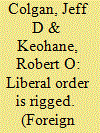

|
|
|
|
|
| Summary/Abstract |
Prior to 2016, debates about the global order mostly revolved around its structure and the question of whether the United States should actively lead it or should retrench, pulling back from its alliances and other commitments. But during the past year or two, it became clear that those debates had missed a key point: today’s crucial foreign policy challenges arise less from problems between countries than from domestic politics within them. That is one lesson of the sudden and surprising return of populism to Western countries, a trend that found its most powerful expression last year in the United Kingdom’s decision to leave the EU, or Brexit, and the election of Donald Trump as U.S. president.
|
|
|
|
|
|
|
|
|
|
|
|
|
|
|
|
| 11 |
ID:
152569


|
|
|
|
|
| Summary/Abstract |
Is the world witnessing the demise of the U.S.-led liberal order? If so, this is not how it was supposed to happen. The great threats were supposed to come from hostile revisionist powers seeking to overturn the postwar order. The United States and Europe were supposed to stand shoulder to shoulder to protect the gains reaped from 70 years of cooperation. Instead, the world’s most powerful state has begun to sabotage the order it created. A hostile revisionist power has indeed arrived on the scene, but it sits in the Oval Office, the beating heart of the free world. Across ancient and modern eras, orders built by great powers have come and gone—but they have usually ended in murder, not suicide.
|
|
|
|
|
|
|
|
|
|
|
|
|
|
|
|
| 12 |
ID:
152570


|
|
|
|
|
| Summary/Abstract |
Just a few months into the Trump administration, it still isn’t clear what course the president’s foreign policy will ultimately take. What is clear, however, is that the impulsiveness, combativeness, and recklessness that characterized Donald Trump’s election campaign have survived the transition into the presidency. Since taking office, Trump has continued to challenge accepted norms, break with diplomatic traditions, and respond to perceived slights or provocations with insults or threats of his own. The core of his foreign policy message is that the United States will no longer allow itself to be taken advantage of by friends or foes abroad. After decades of “losing” to other countries, he says he is going to put “America first” and start winning again.
|
|
|
|
|
|
|
|
|
|
|
|
|
|
|
|
|
|
|
|
|